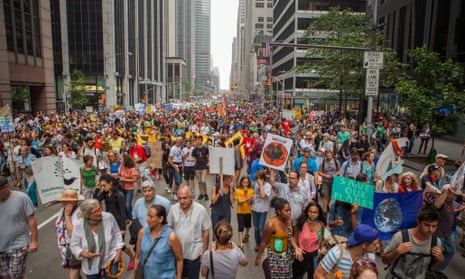So 120 government leaders each made 4 minute speeches about climate change at the United Nations. Did it make any difference?
Yes, but not in the ways you might think.
The UN climate summit did not conclude in a grand ‘agreement’. But that was not its purpose. This was not a negotiating meeting. Indeed it was barely a ‘meeting’ at all: the assembled leaders simply made speeches one after the other, with most of the real debate occurring in later sessions (on energy, forests, finance and so on) in which the main speakers were environment ministers and representatives from civil society and business.
But the summit was nevertheless a vital event, and international climate politics will not be the same after it. Here are five reasons why.
First, most of these heads of government had never made a speech about climate change before. The last summit was five years ago in Copenhagen, when very few current leaders were in office. So now the summit has forced each of them to make a public commitment to stronger climate action.
That’s crucial, because over the next six months every country in the world has to publish a new set of climate targets as part of the international negotiations towards an agreement in Paris next year. With leaders’ public statements now on the record, the chances of stronger policies are much better.
Second, some of the speeches were significant in themselves, with new policy commitments. The most important came from China’s Vice Premier Zhang Gaoli. China, he said, would publish “as early as possible” a date at which it expected its greenhouse gas emissions to reach a peak.
Since China is now by far the world’s largest emitter of greenhouse gases, the mathematical fact is that averting dangerous climate change will only be possible if its emissions stop rising within the next ten years and then begin to fall. Before Monday, China had not committed to any timetable for this. We can now expect it to do so in the next few months.
In his own speech to the summit, president Obama called on China, as a fellow “big country”, to show joint leadership with the US. If China publishes an early date for its emissions to peak, it will be America which comes under the greater pressure to fulfil its global obligations.
Third, the summit stimulated a series of commitments by businesses, governments and others on climate action in specific fields. In the forests session 24 major corporations committed to ending deforestation in their supply chains for palm oil, which if fulfilled will have a significant impact on rainforest conservation. Their statement was endorsed by Greenpeace.
Elsewhere, a group of banks, insurers and pension funds committed to $200bn worth of low-carbon investment by the end of next year, while 2,000 cities around the world announced a joint commitment to emissions reduction.
Each of these announcements was significant in its own way. Together, they begin to build a strong story of action on climate change – not waiting for a new international agreement, but happening already.
Fourth, the summit introduced a new rationale for such action. Several leaders, including Obama and British prime minister David Cameron, noted that there is now no need to choose between economic growth and reducing emissions: countries can do both together. They were quoting from the major New Climate Economy report published last week in advance of the summit, which has provided governments with authoritative new evidence on the economic benefits of climate action.
With the Financial Times and Economist, amongst others, now acknowledging that reducing emissions can help drive stronger economic performance and healthier development, the old argument that acting on climate change is too economically costly is finally being laid to rest.
Fifth, and perhaps most important of all, the summit has re-energised the climate movement.
The reported 400,000 people who took to the streets of New York on Sunday, and the hundreds of thousands who joined them in over 150 cities around the world, have put climate change on the television news bulletins and newspaper editorials. They have reminded both leaders and editors that there are millions of people who care about this, and who are not going to sit quietly if governments do not rise to the challenge. And it has reminded the NGOs that the voices of the people are the strongest voices of all, if only they’ve got the courage to mobilise them.
So the summit decided nothing. But it may well have changed quite a lot. Climate is definitely now back on the agenda. And it’s not going to go away until a new international agreement is signed in Paris next year.

